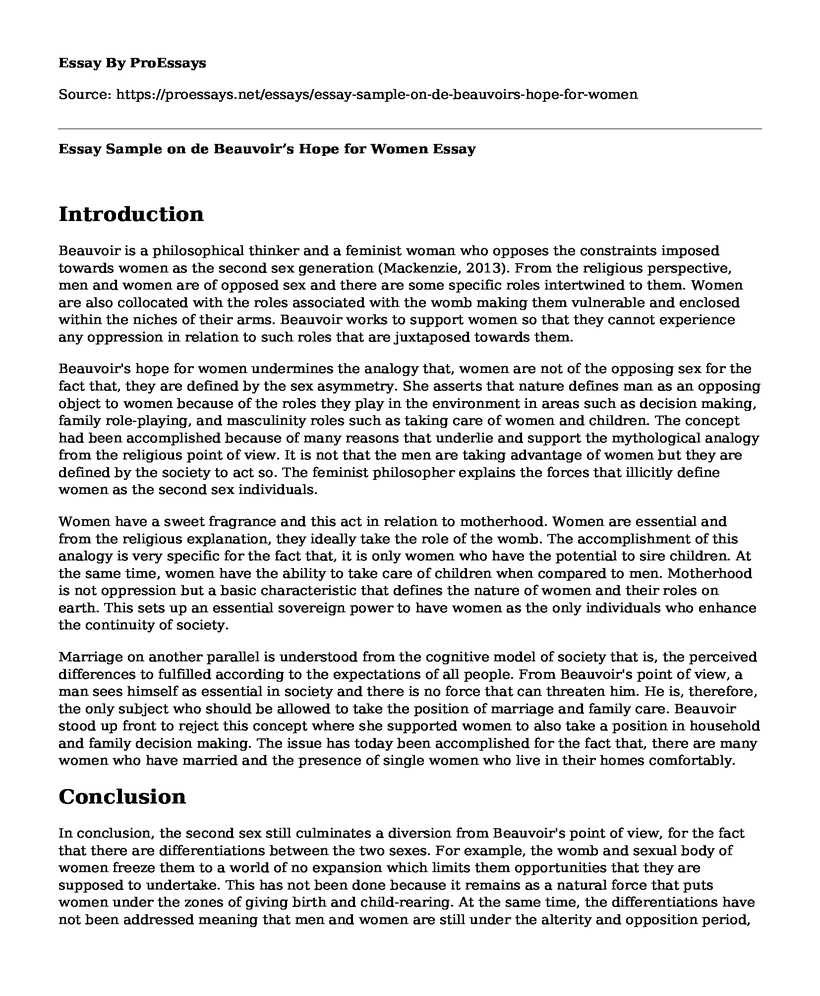Introduction
Beauvoir is a philosophical thinker and a feminist woman who opposes the constraints imposed towards women as the second sex generation (Mackenzie, 2013). From the religious perspective, men and women are of opposed sex and there are some specific roles intertwined to them. Women are also collocated with the roles associated with the womb making them vulnerable and enclosed within the niches of their arms. Beauvoir works to support women so that they cannot experience any oppression in relation to such roles that are juxtaposed towards them.
Beauvoir's hope for women undermines the analogy that, women are not of the opposing sex for the fact that, they are defined by the sex asymmetry. She asserts that nature defines man as an opposing object to women because of the roles they play in the environment in areas such as decision making, family role-playing, and masculinity roles such as taking care of women and children. The concept had been accomplished because of many reasons that underlie and support the mythological analogy from the religious point of view. It is not that the men are taking advantage of women but they are defined by the society to act so. The feminist philosopher explains the forces that illicitly define women as the second sex individuals.
Women have a sweet fragrance and this act in relation to motherhood. Women are essential and from the religious explanation, they ideally take the role of the womb. The accomplishment of this analogy is very specific for the fact that, it is only women who have the potential to sire children. At the same time, women have the ability to take care of children when compared to men. Motherhood is not oppression but a basic characteristic that defines the nature of women and their roles on earth. This sets up an essential sovereign power to have women as the only individuals who enhance the continuity of society.
Marriage on another parallel is understood from the cognitive model of society that is, the perceived differences to fulfilled according to the expectations of all people. From Beauvoir's point of view, a man sees himself as essential in society and there is no force that can threaten him. He is, therefore, the only subject who should be allowed to take the position of marriage and family care. Beauvoir stood up front to reject this concept where she supported women to also take a position in household and family decision making. The issue has today been accomplished for the fact that, there are many women who have married and the presence of single women who live in their homes comfortably.
Conclusion
In conclusion, the second sex still culminates a diversion from Beauvoir's point of view, for the fact that there are differentiations between the two sexes. For example, the womb and sexual body of women freeze them to a world of no expansion which limits them opportunities that they are supposed to undertake. This has not been done because it remains as a natural force that puts women under the zones of giving birth and child-rearing. At the same time, the differentiations have not been addressed meaning that men and women are still under the alterity and opposition period, that is, they are defined by sex asymmetry.
Reference
Mackenzie, C. (2013). 10 Simone de Beauvoir: philosophy and/or the female body. Feminist challenges: Social and political theory, 144.
Cite this page
Essay Sample on de Beauvoir's Hope for Women. (2022, Nov 05). Retrieved from https://proessays.net/essays/essay-sample-on-de-beauvoirs-hope-for-women
If you are the original author of this essay and no longer wish to have it published on the ProEssays website, please click below to request its removal:
- Rodney King Case Study
- Essay Sample on Sport & Masculinity: A Closer Look at Gender Roles
- Paper Example on Narrative Methodology: Examining Patriarchy's Effects on Women
- Essay on Sub-Saharan Africa Excluded from Global Poverty Reduction: Revisiting Beijing-Washington Consensus
- Stereotypes and Poverty: Examining the Impact on Minorities - Essay Sample
- Essay Example on Child Abuse: History and Conflict Resolution
- Paper on Sundown Towns: A Dark History of Segregation & Exclusion







